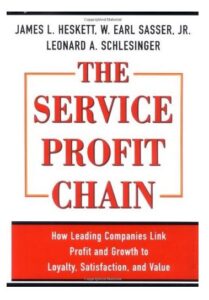The power of employee engagement: why workplace culture matters
In our previous blogs, we explored first, the concept of defining and curating workplace culture as an organisational ‘superpower’ and then, aligning this thinking with Engage for Success’ Four Enablers. But why should organisations invest time, effort, headspace and even budget in their workplace culture? The answer lies in the transformative power of employee engagement. From the groundbreaking work of James Heskett et al’s “Service Profit Chain” to the compelling insights of Professor Alex Edmans’ “Grow the Pie,” we summarise just some of the reasons why workplace culture and employee engagement matter.
Let’s start by revisiting the classic research conducted by James Heskett et al., who first sparked our interest in this whole topic. The “Service Profit Chain” revealed the interconnection between workplace culture, employee engagement, customer satisfaction, and financial performance. For us, at the time external marketeers, this was a real eye-opener. Here’s the chain in a nutshell:
Engaged employees drive customer satisfaction
Engaged employees go above and beyond to deliver exceptional customer experiences. They are motivated, passionate, and genuinely care about the customers they serve. When employees feel valued, supported, and empowered by their workplace culture, they become enthusiastic brand ambassadors who positively impact customer satisfaction levels.
Satisfied customers lead to loyalty and repeat business
Customers who have positive experiences are more likely to become loyal patrons. They trust the brand, feel valued, and enjoy the interactions they have with employees. A workplace culture that fosters employee engagement creates a ripple effect, resulting in satisfied customers who keep coming back for more.
Loyal customers drive revenue growth
Loyal customers are not only more likely to repurchase; they also tend to spend more and provide referrals. They become advocates, spreading positive word-of-mouth and attracting new customers to the organisation. The financial impact of loyal customers is undeniable—they contribute significantly to revenue growth and long-term sustainability.
Revenue growth translates into financial performance
Organisations that prioritise workplace culture and employee engagement experience higher levels of customer loyalty and revenue growth. This, in turn, positively impacts financial performance. By investing in their people, organisations create a virtuous cycle where engaged employees drive customer satisfaction, which leads to business success.
Engage for Success’ comprehensive report, “Nailing the Evidence,” provides further evidence on the impact of workplace culture and employee engagement. The report highlights:
Productivity gains
Engaged employees are more productive, leading to improved organisational performance. The Engage for Success research found that highly engaged teams outperform their less engaged counterparts by 20% to 25% in terms of productivity.
Wellbeing and retention
A positive workplace culture that prioritises employee engagement contributes to improved employee well-being and retention. Engage for Success’ research reveals that engaged employees experience higher levels of job satisfaction, lower stress levels, and better overall mental health.
Innovation and creativity
Workplace cultures that encourage employee engagement foster a culture of innovation and creativity. Engage for Success’ research highlights that engaged employees are more likely to contribute innovative ideas, collaborate effectively, and adapt to change, driving continuous improvement within the organisation.
But let’s explore more recent evidence too. Professor Alex Edmans’ book, “Grow the Pie,” offers compelling insights into the business case for employee engagement. Edmans argues that organisations that prioritise purpose, stakeholders, and long-term value creation outperform their peers in terms of financial performance.
Increased financial returns
According to Edmans’ research, companies with high employee satisfaction outperform their peers by up to 2.3% to 3.8% per year in long-run stock returns. Engaged employees contribute to improved productivity, innovation, and customer satisfaction, all of which drive financial success.
Talent attraction and retention
Edmans emphasises that engaged employees are more likely to stay with an organisation and attract top talent. Companies that prioritise employee engagement create an appealing workplace culture that becomes a competitive advantage in attracting and retaining the best employees.
Long-term value creation
By fostering employee engagement and aligning organisational goals with purpose and stakeholder value, organisations can achieve sustainable, long-term value creation. Edmans argues that a focus on long-term value maximisation benefits not only shareholders but also customers, employees, and the broader society.
Workplace culture and employee engagement are critical drivers of organisational success. From the classic insights of the “Service Profit Chain” through Engage for Success’ “Nailing the Evidence” report to Professor Alex Edmans’ research, the evidence overwhelmingly supports the importance of investing in culture and engagement.
By prioritising employee engagement and fostering a positive workplace culture, organisations unlock the potential for increased productivity, enhanced well-being, reduced absenteeism and turnover, financial performance, talent attraction, and long-term value creation.
So, let’s unleash the power of engagement and create workplaces where everyone thrives.
Photo credit: Cat Hadler, Creative Commercial Photography, on behalf of the Business Culture Awards




